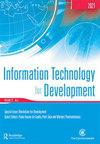区块链技术在加纳经济转型中的前景:基于现象的方法
IF 5.1
3区 管理学
Q1 DEVELOPMENT STUDIES
引用次数: 6
摘要
摘要基于现象的方法用于了解区块链技术如何在降低风险的情况下,在成本节约、效率和可靠性方面改善加纳的经济部门。通过我们提出的支持区块链的框架,我们描述了区块链的物联网(IoT)和分布式账本技术(DLT)如何降低农业和农产品加工行业供应链中的交易、合同和监控相关成本。我们还展示了智能合约(SMC)和分布式账本技术(DLT)如何在采矿和矿产加工行业的本地采购、物流合同执行和供应链中提高基于时间和成本的效率。在IoT、DLT和SMC的帮助下,可以减少金融部门的信息不对称,以改善中小企业的融资。技术组织环境(TOE)要素在区块链技术的采用中仍然至关重要。因此,为区块链的采用提供足够的框架至关重要。本文章由计算机程序翻译,如有差异,请以英文原文为准。
Blockchain technology prospects in transforming Ghana’s economy: a phenomenon-based approach
ABSTRACT A phenomenon-based approach is used to learn more about how blockchain technology could improve Ghana’s economic sectors in terms of cost savings, efficiency, and reliability with reduced risks. With our proposed blockchain-enabled frameworks, we describe how blockchains’ Internet-of-Things (IoTs) and Distributed Ledger Technologies (DLTs) might reduce transaction, contract, and monitoring-related costs in the Agriculture & Agro-processing sector’s supply chains. We also demonstrate how Smart Contracts (SMCs) and Distributed Ledger Technologies (DLTs) can improve time and cost-based efficiencies in local procurements, logistic contract execution, and supply chains across the Mining & Minerals processing sector. With the help of IoTs, DLTs, and SMCs, information asymmetries in the finance sector can be reduced to improve the financing for Small and Medium-sized Enterprises (SMEs). The Technological-Organizational-Environmental (TOE) elements remain crucial in the adoption of blockchain technology. As a result, it’s critical to provide adequate frameworks for blockchain adoption.
求助全文
通过发布文献求助,成功后即可免费获取论文全文。
去求助
来源期刊

Information Technology for Development
Multiple-
CiteScore
11.30
自引率
16.70%
发文量
34
期刊介绍:
Information Technology for Development , with an established record for publishing quality research and influencing practice, is the first journal to have explicitly addressed global information technology issues and opportunities. It publishes social and technical research on the effects of Information Technology (IT) on economic, social and human development. The objective of the Journal is to provide a forum for policy-makers, practitioners, and academics to discuss strategies and best practices, tools and techniques for ascertaining the effects of IT infrastructures in government, civil societies and the private sector, and theories and frameworks that explain the effects of IT on development. The concept of development relates to social, economic and human outcomes from the implementation of Information and Communication Technology (ICT) tools, technologies, and infrastructures. In addition to being a valuable publication in the field of information systems, Information Technology for Development is also cited in fields such as public administration, economics, and international development and business, and has a particularly large readership in international agencies connected to the Commonwealth Secretariat, United Nations, and World Bank.
 求助内容:
求助内容: 应助结果提醒方式:
应助结果提醒方式:


